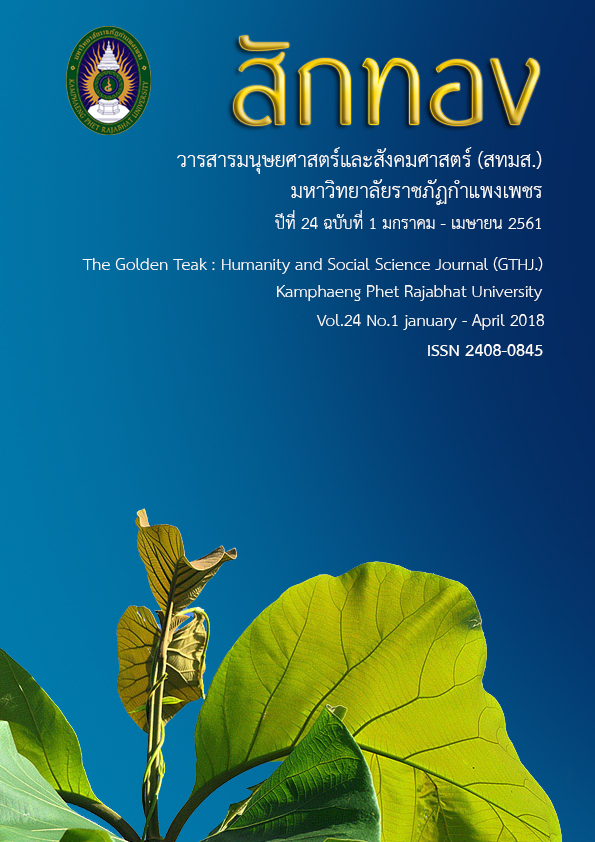Community of Practices Learning for Developing Community Well-being : Participatory Action Research
Main Article Content
Abstract
The objectives of this research were: 1. to study lessons learned from communities of well-being practice in a variety of contexts, and 2. to make policy recommendations and implementation strategies for community of learning practice for developing community well-being. This research comprised participatory action research methods and qualitative research. The case studies covered four regions: 1) the northern part of Thailand namely Donkaew Subdistrict Administrative Organization, Maerim in Chiangmai; 2) Suanphueng hospital, Ratchaburi, Central Thailand; 3) Tonbakrasbamrung school, Trung in Southern Thailand and; 4) Wungsang Subdistrict Administrative Organization, Kaedum, Mahasarakham in the Northeast. Key informants included administrators, committees, members of the community and the network of community of practices, making a total of 80 informants. The tools of this study comprised lessons learned from participation, empowerment evaluation and mind-mapping. Content analysis was used on the data to meet the research objectives. The results of the research were as follows: 1. The development of communities of practice for promoting community well-being has several formats depending on the integration and management guidelines of each area. Important factors include: 1) understanding the goals of community well-being; 2) focusing on the importance of the context of each area; 3) knowledge according to the needs of the community; and 4) community of practice development needs focusing on human centeredness and developing three elements, namely, (i) building positive relationships between the groups (ii) developing activities and creating awareness and (iii) providing the necessary knowledge and skills for developing the groups. Recommendations for policies on the development of communities of practice are that they : (1) must be based on social and cultural capital, (2) Community of practice is a development tool suitable for supporting other development practices, (3) should network civil society development cooperation to integrate community of practice learning in order to strengthen the community, and (4) develop community of practice “learning to learn” based on participatory action research.
Article Details
บทความที่ได้รับการตีพิมพ์เป็นลิขสิทธิ์ของวารสาร สักทอง : วารสารมนุษยศาสตร์และสังคมศาสตร์ สถาบันวิจัยและพัฒนา มหาวิทยาลับราชภัฏกำแพงเพชร
ข้อคิดเห็นใดๆ ที่ปรากฎในวารสารเป็นวรรณกรรมของผู้เขียนโดยเฉพาะ ซึ่งมหาวิทยาลัยราชภัฏกำแพงเพชรและบรรณาธิการไม่จำเป็นต้องเห็นด้วย
References
Chutavichit, K., et al. (2018). Local Community Self-Management Lessons: Economy and Security. Nakhon Pathom : Research and Development Institute.
Fukuyama, F. (1995). Trust : the Social Virtues and the Creation of Prosperity. London : Penguin.
Jantotai, D. (2012). Strengthening Social Capital in the Communities of Thailand. Journal of Social Research, 35(1), 23-51.
Kamsrichan, W. (2007). Knowledge Management Empowerment by PAR Research. Bangkok : P.A. Living.co.Ltd.
Kutrakul, A. (2010). Social Innovation : Case Studies of Local Initiatives in Northern Thailand. A dissertation for the degree of doctor of Doctor of Public Administration Program, National Institute of Development Administration.
Poungsomlee, A. (2007). Community of Practices-CoPs. Nakhon Pathom : Division of Quality Development Mahidol University.
Suwanwong, A. (2016). Characteristics of Professional Learning Communities in Thai Educational Context. Panyapiwat Journal, 8(1),165.
Wasi, P. (2007). New Learning System to Overcome the Crisises of the Age. Bangkok : Ruam Duay Chuay Kan Publishing.co.Ltd.
_______. (2017). Strong Social Strategy. Nonthaburi : National Health Commission Office (NHCO).
World Bank. (1999). Project Appraisal Document on a proposed Learning and Innovation Credit to the Amount of SDR 3.6 Million Equivalent to the Kingdom of Cambodia for a Northeast Village.
Yoddumnern-Attig, B., et al. (2009). Qualitative Research. Nakhon Pathom : Institute for Population and Social Research.


